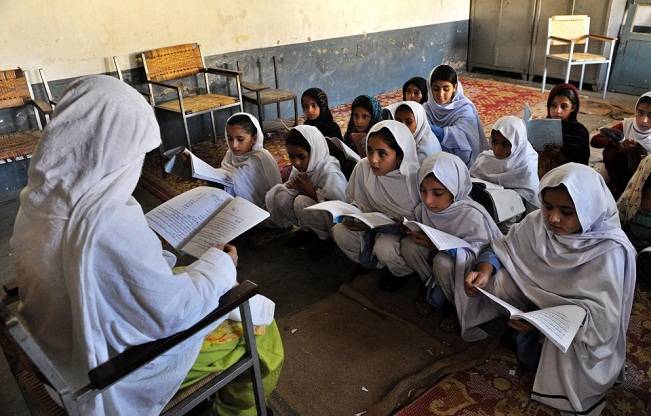With results of various examination boards in Pakistan being released, one thing has been made clear: girls have outperformed boys in almost every examination. Even with glaring inequalities in terms of employment, rights and income, girls in Pakistan continue to show us their potential. They are an asset that remains untapped due to societal taboos and forced male dominance at the workplace.
Girls outclassed boys by grabbing overall top two positions with the third one being shared by two girls and a boy in the Secondary School Certificate (matriculation) Examination 2015 results. In the Bannu Board of Intermediate and Secondary Education, girls outdid boys in the FA/FSc results. The Agha Khan University Examination Board shows the same trend. With such a magnanimous outpour of news regarding better performance by women, can we now stop idealising the rundown narrative of men being the ‘God-sent’ successors of our country and economy? Women have proven to be superior in mind and intellect in most of the exam results, proving that superiority comes from hard work, not the physical attribute of sex. Given the space and opportunity, women have much to offer to Pakistan’s development.
In a growing number of poor countries the balance of who is doing better, girls or boys, has shifted. Policymakers who once fretted about girls’ lack of confidence in science now spend their time dangling books before surly boys. Sweden has commissioned research into its “boy crisis”. Australia has devised a reading programme called “Boys, Blokes, Books & Bytes”. In just a couple of generations, one gender gap has closed, only for another to open up. Pakistan may not be making a conscious effort to make sure that this gap is reduced and will not, as custom and society dictate that jobs, positions and power are handed of to men regardless. Our girls realize that if they do not strive to make sure they succeed on their own, nobody else will help them out. It seems that education has become their form of resistance, for the lack of opportunities provided.
The changing social dynamics in the country have done more to encourage women to enter higher education than any deliberate policy. Although, credit must be given to programmes, even though being in dearth, have been advocating education for women. With resilience, ambition and the drive to make opportunities for themselves, it seems that girls have started proving themselves as equivalent to boys their age, both academically and in their careers.
Although it is vital that we promote gender equality in schools, we also need to make sure that we're doing more to understand why these gaps, persist and what other policies we can develop to close them. There is no point in celebrating good results if girls are not allowed to pursue their interests later in life. They face all sorts of resistance; from forced marriage to harassment at the work place. This must end. Women and men are equal.
One must also be wary of the fact that the disparity between women themselves, depending upon which strata they belong to, is as wide as gender inequality itself. A more concrete effort should be made to make sure more girls, tap into their academic potential, despite blatant social and economic inequality.
Friday, April 26, 2024
Against All Odds

China wants ‘just, lasting’ solution to Palestine issue
1:21 PM | April 26, 2024
Three-day global science-policy forum: Socially inclusive solar irrigation systems
11:02 AM | April 26, 2024
DG kicks off tree plantation drive in ICT
April 26, 2024
11 outlaws arrested in district raids
April 26, 2024
Economic Challenges
April 26, 2024
No Compromise
April 26, 2024
Strength and Solidarity
April 26, 2024
Musk vs Australia
April 25, 2024
Reforming Rehab
April 25, 2024
Photon power
April 26, 2024
Justice prevails
April 26, 2024
Ending animal suffering
April 25, 2024
AI governance
April 25, 2024
AI concerns
April 25, 2024
ePaper - Nawaiwaqt
Advertisement
Nawaiwaqt Group | Copyright © 2024





